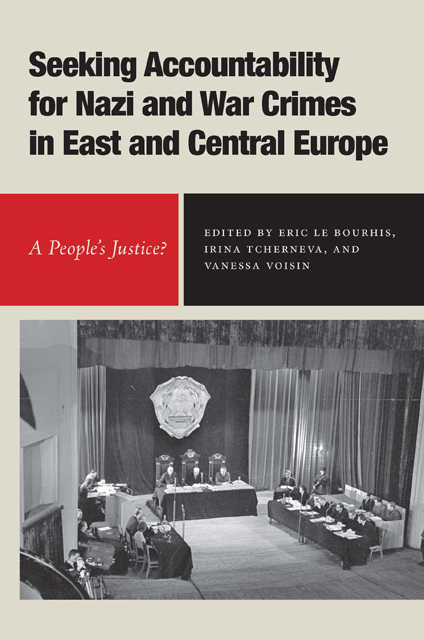5 - Concentration Camp Crimes on Trial, on TV, and in Civic Education: Bonn, 1958–1959
Published online by Cambridge University Press: 20 December 2022
Summary
On October 13, 1958, the former SS members Gustav Sorge and Wilhelm Schubert were put on trial at the district court of Bonn. The defendants were accused of murder and complicity in murder in more than eleven thousand instances, committed while serving as guards of the concentration camps in Esterwegen and Sachsenhausen between 1935 and 1942. The defendants had been charged once before, during a trial in Berlin-Pankow, which was conducted by the Soviets in 1947. The trial in Bonn, which lasted from October 1958 to February 1959, was the first in the Federal Republic of Germany (FRG) that dealt extensively with crimes committed in the Nazi concentration camp system. The Bonn trial was litigated only a few months after the well-known Ulm trial, which dealt with mass murders of Jews committed by SS detachments in occupied Lithuania—and as a result of that led to the founding of the Central Office in Ludwigsburg in 1958. The Bonn trial was accompanied by heavy media publicity: in addition to extensive press coverage, parts of the trial were filmed and then broadcast nationwide in the form of a mid-length television report. After that broadcast, the TV report was distributed as a film for “political education” (that is, civic education). This state-initiated activity occurred under the umbrella of the Federal Center for Homeland Service, an authority subordinate to the Federal Ministry of the Interior. At the end of the 1950s, civic education gradually began to put crimes committed during the National Socialist period on its agenda. Thus, the film was distributed and screened with the title KZ-Schergen (Henchmen of the Concentration Camp, 1959, 33 min., produced by the Civic Education Office of North Rhine–Westphalia). In addition to an examination of the crimes committed in concentration camps like Sachsenhausen, the film aimed to demonstrate the procedures of law that guided the Bonn trial as the standards of a state governed by a democratic constitution—as the FRG proclaimed itself to be.
Not only the fact of the Bonn trial but also the later usage of the film are noteworthy. In 1964, a half decade after the trial, a law was introduced in West Germany prohibiting the recording of court hearings for the purpose of public use—be it on television, in a film, or on radio.
- Type
- Chapter
- Information
- Seeking Accountability for Nazi and War Crimes in East and Central EuropeA People’s Justice?, pp. 190 - 220Publisher: Boydell & BrewerPrint publication year: 2022



